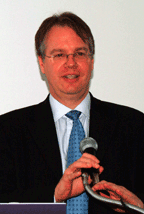Renowned Weill Cornell Surgeon Lectures in Qatar

Michel Gagner, M.D., FACS,
FRCS, professor of surgery
at WCMC–NY and New York
Presbyterian Hospital
Michel Gagner, M.D., FACS, FRCS, professor of surgery at WCMC-NY and New York Presbyterian Hospital, visited Qatar in mid-April and gave a lecture to medical staff at the Hamad Hospital on recent advances in surgery for the treatment of obesity.
During his visit to Qatar, Dr. Gagner also met faculty and staff at WCMC–Q and toured the new building.
A leading expert in the field of surgery for weight reduction using laporoscopic techniques, Dr. Gagner identified significant benefits from gastric bypass surgery for the obese patient, notably considerable reduction in weight, and dramatic improvements in health problems such as type 2 diabetes, hypertension and liver disease.
Dr. Gagner began his lecture by outlining the scale of the problem of obesity. Defining morbid obesity as a Body Mass Index (BMI) of over 40, where the normal BMI is 25*, he predicted that obesity would overtake tobacco to become "the most preventable cause of death" in some societies within a few years. It is estimated that in the U.S. alone, some 10 million people are in need of surgical intervention for the problem.
The implications in terms of public health are serious, with increased incidence of a wide range of complaints from certain forms of cancer, type 2 diabetes, and coronary heart disease, to fibrosis, and even cirrhosis, of the liver. Dr. Gagner went on to look at the three most widely used surgical procedures for treatment of morbid obesity: gastric banding, duodenal switch and gastric bypass.
Of the three, he favors gastric bypass for patients whose BMI is below 50. It has been shown to result in very effective weight loss over the long term, with no leakage or mortality. Complications may occur in patients on the upper end of the scale, and a two-stage procedure with an interval between the stages is advisable. In the case of very seriously obese patients, duodenal switch may be more appropriate.
In gastric bypass a small pouch is created from part of the stomach and then connected to the small bowel - effectively bypassing the remainder of the stomach. It leads to very effective weight loss over a period of some 5 months post-operatively, and it appears to alter appetite - patients report that the "smell and taste of food is different" Dr Gagner said. This is probably as a result of the suppression of the hormone ghrelin, which is secreted in the fundus of the stomach, and which has a role in controlling appetite.
Very interestingly, Dr. Gagner also reported that 83% of type 2 diabetes resolve after gastric bypass surgery, even before all the weight has been lost. He suggested that this may be a function of the change in hormones, and he identified the role of hormones in inducing diabetes as an important area for possible research in the future.
In his wide-ranging lecture, with numerous excellent illustrations and video clips, Dr. Gagner also examined the face of things to come in laparoscopic surgery. He felt that the use of robotic techniques is set to expand, and there will be a whole new approach to the training of aspiring surgeons.
Rather like pilots, surgeons will use simulators to learn the techniques of their profession. They will be able to gain hours of experience in clipping, sewing and knotting in Virtual Reality before moving into the operating room and carrying out surgery on live patients. Could it be that the best way our children can train for a future career in surgery will be on those video games we all love to hate?

* Morbid obesity is also defined as being at least 100lbs over the ideal body weight)
Photographs courtesy of the Hamad Medical Corporation
For a report on the lecture published in the English language daily "The Peninsula" on April 17, 2004, click
here ![]()
